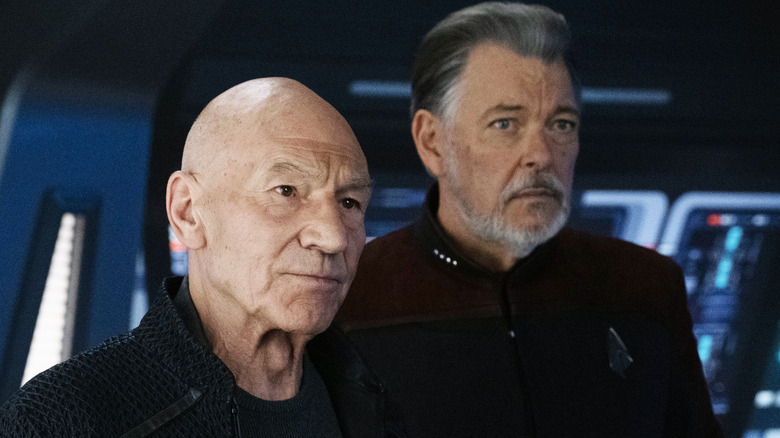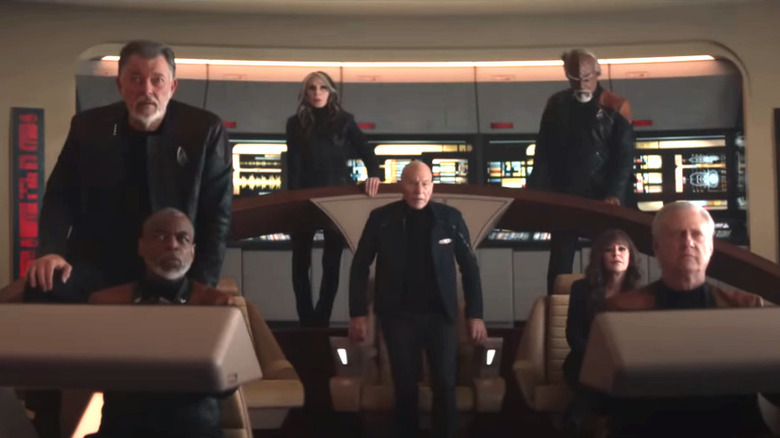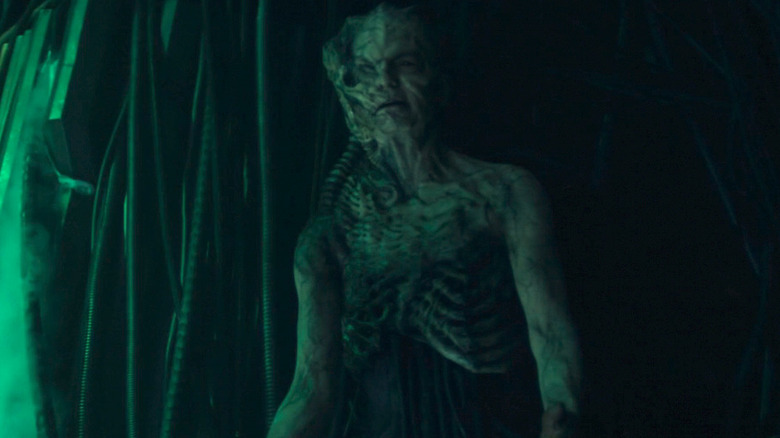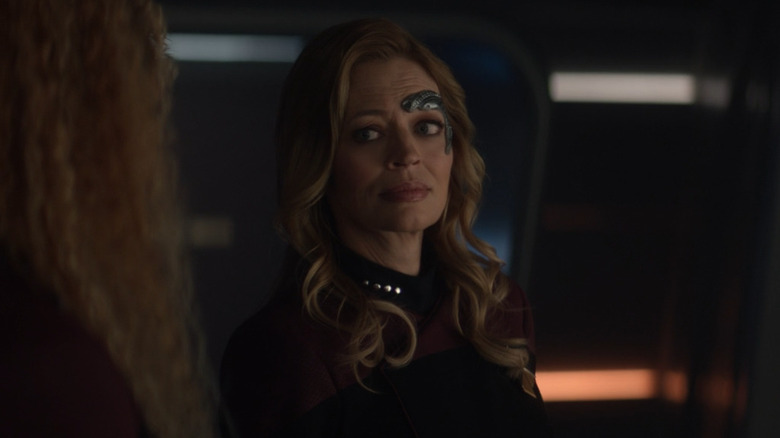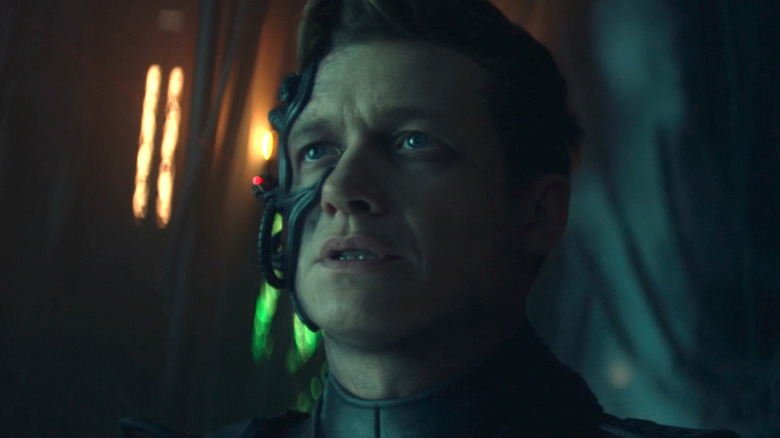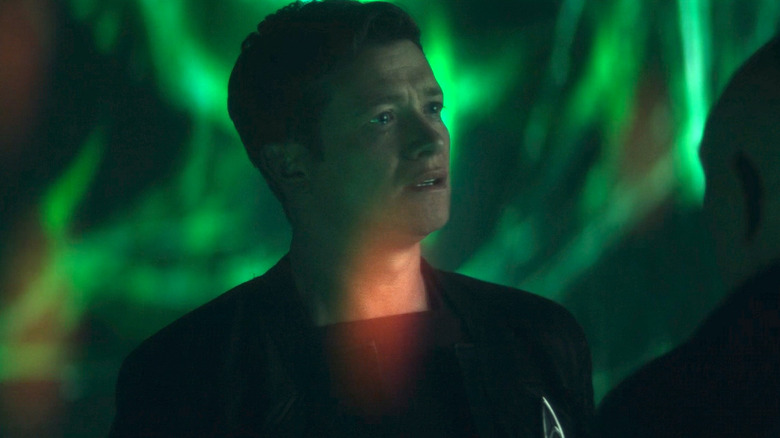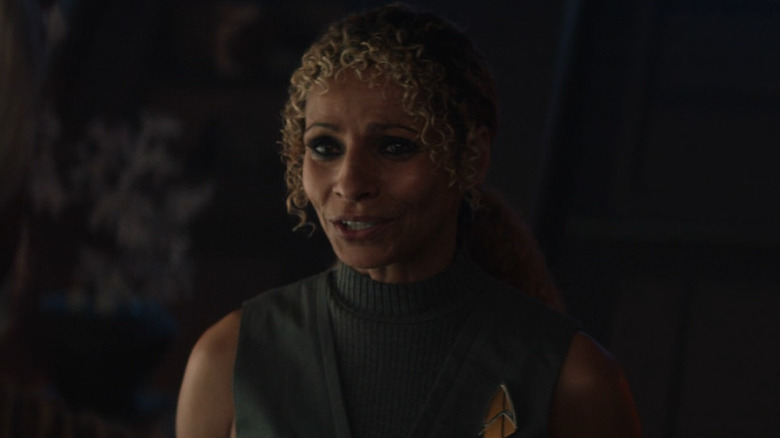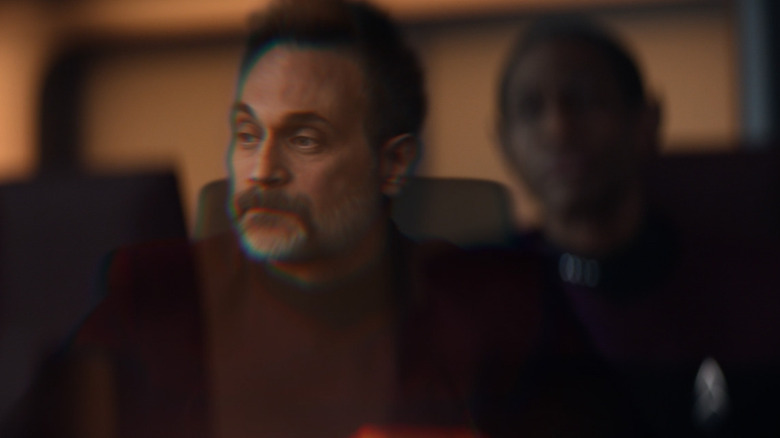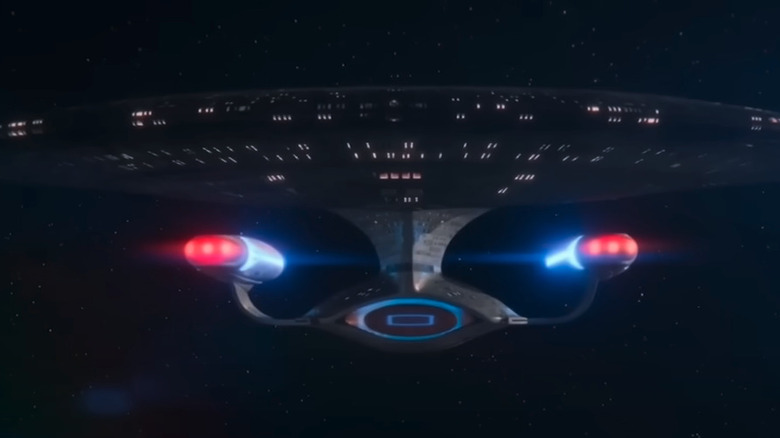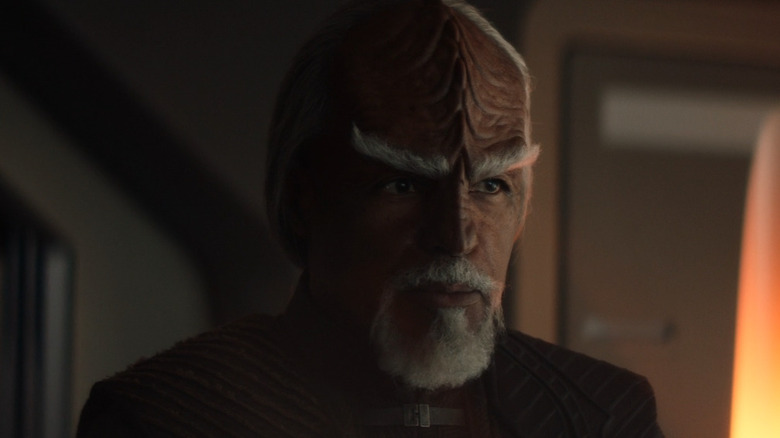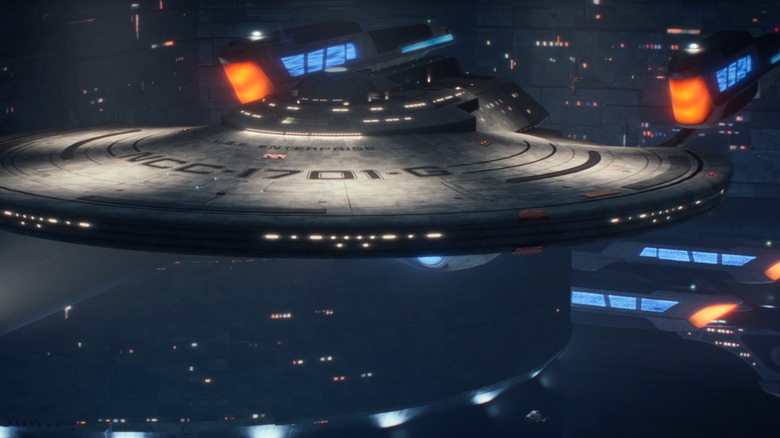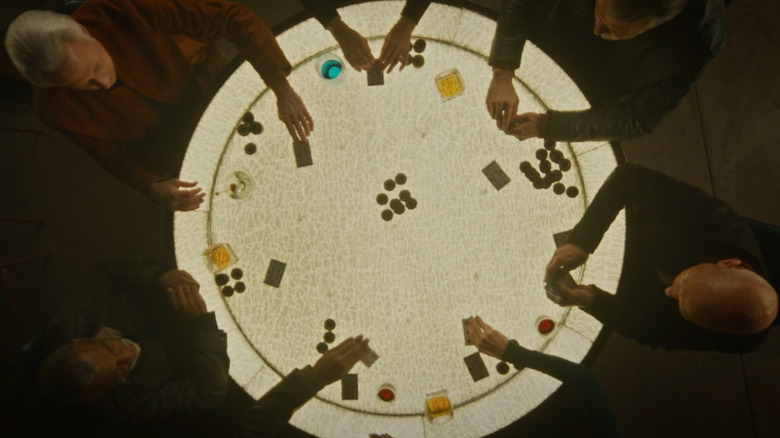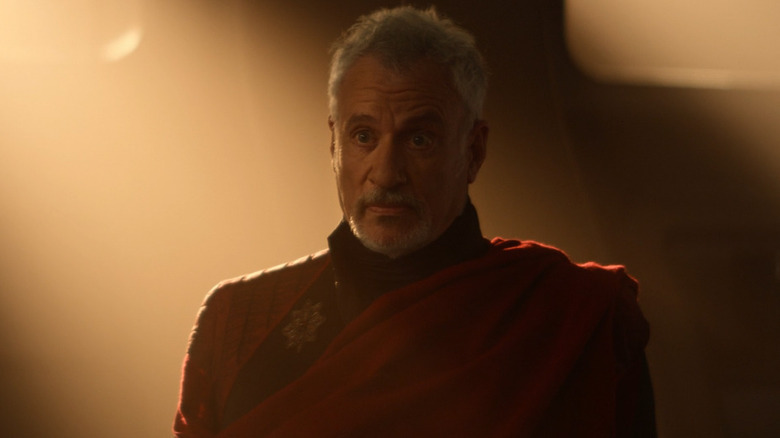The Ending Of Star Trek: Picard Explained
Season 3 of "Star Trek: Picard" has come to an explosive end with series finale "The Last Generation," leaving fans with plenty to unpack. The final season of the spin-off series finally reunites Jean-Luc Picard with his former Enterprise crew, adding LeVar Burton, Marina Sirtis, Michael Dorn, Gates McFadden, Jonathan Frakes, and Brent Spiner to the cast. Returning alongside them is Jeri Ryan as Seven of Nine and Michelle Hurd as Raffi Musiker.
A rollercoaster adventure full of surprises, Season 3 kicks off with Picard receiving a call for help from his old friend Dr. Beverly Crusher. Gate-crashing the inaugural voyage of the newly-commissioned U.S.S. Titan, Picard discovers that he has a son who has been hidden from him for more than 20 years. But they're soon pursued by an old foe: Changelings have emerged after their decades-long absence following the Dominion War, and they're bent on revenge against the Federation.
On the way to the final installment, it's revealed that the Borg have been behind the Changeling plot all along, and Picard's son Jack is key to their plans. Now that it's all over, it's time to dig into every detail of the "Star Trek: Picard" finale. We're here to unravel its mysteries, explore its messages, see how it all ties up, and prepare Trekkies for whatever comes next.
A new hope
Hope has been a central, enduring message throughout "Star Trek: Picard," and it rings just as true as the series ends. When we first reconnect with him as a retired, world-weary winemaker in Season 1, Jean-Luc Picard seems to have lost his hope in the future, mankind, and himself. Thanks to visits from a young android in Season 1, an immortal trickster in Season 2, and a desperate call for help from an old friend in Season 3, Picard has finally realized that hope is never truly lost.
In the finale episode "The Last Generation," the Borg have returned and assimilated a new drone army. Earth is about to fall. But Picard has reassembled his old crew, pulled the U.S.S. Enterprise out of mothballs, and set a course to stop them. However, the Borg Queen has an unexpected ally: Jack Crusher, son of Picard and Dr. Crusher. He's inherited his father's Borg-assimilated DNA and is acting as the voice of the Borg collective. Now the Earth is on the verge of destruction, all the younger Starfleet officers have been assimilated through a piece of Borg genetic code introduced to their DNA through transporters, and the entire Federation fleet is under Borg control.
Things look as hopeless as they've ever been. But then, a message is received by Federation President Anton Chekov (voiced by "Star Trek" legend Walter Koenig and named after the late Anton Yelchin): "Hope is never lost. There are always possibilities."
A new evolution of the Borg
All season long, fans see evolution. First we meet Vadic, a Changeling whose rogue faction of shapeshifters have new abilities that help them survive. We also meet a new version of Commander Data, an android golem infused with the personalities of different Soong androids, representing an evolution of his former self. As his creator puts it, "Evolution is not an act of preservation, it's addition."
In "The Last Generation" we see that the Borg have evolved too. The crew must go aboard a cube hiding in Jupiter's gasses and shut down a beacon that is controlling the Federation fleet. They don't just find the Borg Queen, however: They also discover a fully-assimilated Jack Crusher, who is the voice of a new Borg collective and an evolution of their species.
Face to face with the new Borg Queen, Picard learns that the collective has been weak and vulnerable since last we saw them. Thanks to their alliance with the Changelings, though, their new collective no longer requires assimilation at all, or even the combination of machine and biology: They can propagate genetically, with the Federation's young becoming their new generation of Borg. Thus, their new mission is not to assimilate, but to annihilate. They have not taken Soong's words to heart, though — they only evolve to survive, and that turns out to be their weakness.
Seven finds her family
Season 3 of "Star Trek: Picard" hasn't just been about the reunion of the "Star Trek: The Next Generation" crew (though you'd be hard-pressed to find anyone who wasn't thrilled by that). The story of Seven of Nine also takes center stage, and comes to its conclusion in "The Last Generation," fulfilling an arc that began all the way back in "Star Trek: Voyager."
Since she left the Borg collective in Season 4 of that series, Seven has struggled to find her place. In Season 1 of "Picard," we discover that Seven has joined a group of do-gooding outlaws called the Fenris Rangers, before finally agreeing to join Starfleet at the end of Season 2. But her time aboard the U.S.S. Titan as first officer isn't always pleasant. Frequent clashes with Captain Shaw — whose personal resentment of her Borg nature makes him icy towards her — leaves her feeling isolated and alone, and unsure if Starfleet is where she belongs.
But when the Borg attacks, Shaw is killed, leaving Seven in command. In "The Last Generation," she rises to the occasion. With the help of Raffi, she retakes the bridge from Borg control, and, after discovering that Picard is attempting to shut down the enemy beacon, develops a plan to buy Earth time by disrupting the Borg-controlled fleet. Embracing her inner Captain Janeway, Seven even gives an inspiring pep talk to her ragtag crew, demonstrating just how far she's come.
Loneliness, belonging, and purpose in the hive mind
Though the fanfare around Season 3 of "Star Trek: Picard" mostly regards the return of the "Star Trek: The Next Generation" crew, the season also adds a major new character: Jack Crusher. The son of Jean-Luc Picard and Beverly Crusher, he's lived most of his life fighting by his mother's side on the fringes of the Federation. But as he got older, Jack knew he was different. He suffered from sleepless nights and disturbing dreams, and struggled to find meaning in his life.
Eventually, Jack experiences waking hallucinations. In "VOX," he comes face-to-face with the Borg Queen and finally realizes why he suffers these spells. He's inherited some of his father's Borg-altered DNA, and his physiology is being used by the Queen as a kind of transmitter, to access new Borg drones. Once he's connected to the Borg hive mind, Jack finds the one thing he's always sought: belonging. Like the Queen, who spent years as a solitary collective, Jack has suffered endless loneliness in his life. Now, he finds a sense of meaning and purpose with the Borg.
Family is everything
The role of family is central to Season 3 of "Star Trek: Picard," and the revelation that Jean-Luc Picard has a son with Dr. Crusher isn't the only way it makes itself known. When we first meet Geordi La Forge, now a Commodore and director of the fleet museum, he too is having some serious family problems. His daughter Sidney is helmsman of the U.S.S. Titan, and she doesn't have the best relationship with him. When she puts her career and her life on the line to help Picard against the Changelings, she makes it clear that her crew is her family. In "The Last Generation," this same message resonates again.
Aboard the Borg cube, Picard is joined by Riker and Worf on a mission to disconnect the Borg beacon. But when faced with the destruction of the ship, Picard realizes he can't leave his son behind. It's then that he relinquishes his role as a Starfleet officer — a role he's repeatedly said is all he needs — to be a father and save his son. When confronted with Jack's decision to stay with the Borg collective, his father displays a willingness to die with him. It is this that convinces Jack to disconnect from the hivemind.
In the end, Picard — a man who never wanted or needed a family of his own — not only has one, but understands how important family can be. From blood family to found family, everyone from Seven to Raffi to Picard himself accepts that it truly means more than anything.
Sins of the past
More than 30 years ago, in "The Best of Both Worlds," Jean-Luc Picard is assimilated by the Borg to become their leader, Locutus. As a Borg, Picard helps the collective wipe out an entire Starfleet armada at the infamous Battle of Wolf 359, and is responsible for thousands of deaths. Since then, the physical scars of his assimilation may have healed, but Picard has remained haunted by the incident. "Star Trek: First Contact" allows him a measure of revenge on the Borg, but Season 3 of "Star Trek: Picard" and "The Last Generation" in particular sees him finally come to terms with the experience.
In the finale, he's able to not just be part of destroying the Borg Queen, which signals the end of the Borg forever — he also accepts that his time as Locutus does not define him. He no longer needs to carry the burden of that trauma, because it's who he is now and what he does today that really matters. Picard isn't the only one who learns this valuable life lesson. By the end of "The Last Generation," Raffi Musiker, who has long struggled with addiction and past mistakes, does the same thing. In rising up to help save the Federation, she too accepts that who she can be is what's important, not who she was. That Worf is able to help her get recognition for her heroics is icing on the cake.
Roads to redemption
In Season 3 of "Star Trek: Picard," Picard finds true redemption as a hero. Like so many other themes this season, he shares this experience with many other characters, including Raffi, Seven, and Captain Liam Shaw, who sadly doesn't live to see Seven and Picard's final victory over the Borg.
Introduced in Season 3, Shaw isn't what you'd call the friendly sort. He's more than just obsessed with rules and protocol — he's actively dismissive of his first officer, refusing to call her by her chosen name, Seven of Nine. He also disregards Starfleet legends like Picard and Riker, and is practically gleeful at the thought of seeing them court martialed. Part of this comes from his tragic past as a survivor of Wolf 359; he's always held Picard responsible for his role in the disaster.
Following the destruction of the Borg Queen, however, Captain Tuvok arrives to show Seven of Nine the final performance review Shaw wrote for her before their mission began. The late Shaw calls her reckless and unrelenting, but also brave and loyal, and recommends a promotion to captain. He also refers to her by her preferred name, which suggests he doesn't even need redemption at all — he was simply hiding the good and honorable man within the whole time.
A legend returns to action
We'd be remiss if we didn't talk about the return of the starship Enterprise, restored after its destruction in "Star Trek: Generations." "The Last Generation" sees the Enterprise-D back in action fighting the Borg, and while Picard, Riker, and Worf are on the Borg cube, Geordi La Forge is left in command. Then, the Borg ship turns its weapons on them.
Despite being decades old, the Enterprise manages to evade their targeting scanners. With the help of skillful Dr. Crusher — who's had a lot of practice fighting off foes over the last 20 years — they're able to take out their weapons. When Riker and Worf send them the location of the Borg beacon, however, it's up to the new Data and his gut feelings to pilot them inside the Borg cube and take it out. With Picard locked in existential struggle for control of his son Jack, getting them out before Earth is destroyed by the Borg fleet may be a problem.
In a heartbreaking choice, the remaining crew of the Enterprise agrees that they may have to sacrifice Worf, Riker, Picard, and Jack to save the Federation. If you're expecting shocking deaths in the series finale, though, you'll be disappointed — with the old Enterprise, anything is possible. They're able to locate and beam them up just before the cube is destroyed. In the episode's conclusion, we learn that the Enterprise-D has taken its rightful place as an exhibit at the fleet museum.
Old friendships renewed and new ones forged
The cast of "Star Trek: The Next Generation" is tied together by close friendships, both on the show and in real life. In the world of "Star Trek," though, most of them haven't seen each other in years, and are spread out across the galaxy. But Season 3 of "Star Trek: Picard" sees them all come back together when Picard receives a cry for help from Dr. Beverly Crusher and soon discovers that the son he never knew he had is at the center of a plot against the Federation.
By the end of "The Last Generation," it's clear that these renewed friendships aren't going to be dissolving any time soon. The new and improved Data is seen getting counseling from Deanna Troi, which helps him realize that being human is as difficult and complex as aspiring to be human. Meanwhile, Picard and Dr. Crusher appear to be happy co-parents, if not more. The finale solidifies the fact that this crew is a family now and forever, and will remain close.
But the series finale is about more than a renewal of bonds — it's about new ones, too. Worf makes his friendship with Raffi Musiker clear, calling her a fellow warrior. Meanwhile, as Seven takes command of her own starship, we see the newfound friendships she's made with her new crewmates, Sidney La Forge and Jack Crusher, flourish.
The power of legacy
When Season 3 of "Star Trek: Picard" begins, Picard insists that he doesn't need a legacy. He's come to terms with never having had a family, and is happy to leave behind his accomplishments unto themselves, whether history remembers him or not. But all of that changes with the discovery of Jack Crusher. Suddenly, Picard is confronted with the fact that he does have a history to pass on to another generation of Picards.
As "The Last Generation" comes to a close, we flash forward one year from the events of Frontier Day, when Picard and his crew save the Federation from the Borg. Here, we learn that Jack has been accepted into an accelerated program at Starfleet Academy, and is now an ensign. His mother and father — who may or may not have renewed their romantic relationship — escort him via shuttle to his new assignment. Jack thinks that his family name has given him favor among the Starfleet brass, but Picard insists that such legacies mean nothing. He's proven wrong immediately, however, when Jack reveals that his first assignment is aboard the U.S.S. Titan, which has been re-christened the U.S.S. Enterprise-G in honor of Picard and his crew.
A send-off fit for heroes
When showrunner Terry Matalas set out to craft Season 3 of "Star Trek: Picard," part of his motivation was to give the "Star Trek: The Next Generation" crew the proper send-off they never got in their feature films. While fans will debate how many of his goals he managed to achieve, it's hard to argue that Matalas didn't stick the landing on this one.
Following the time jump a year past Frontier Day, the crew gathers at Guinan's bar Ten Forward in Los Angeles for a celebratory drink. While Riker and Troi plan a vacation and toasts are given, Data gets in half a joke — a throwback to Episode 2 of "Star Trek: The Next Generation" — and Dr. Crusher urges Worf to sing a little Klingon opera. To cap off the night, Picard proposes a friendly game of poker.
This calls back to the card games they played for years as a close-knit crew. The episode's final scene also mirrors the closing shot of the series finale "All Good Things," from all the way back in 1994. As they settle their hands and Picard collects his pot, the overhead camera pans out, and the iconic "Star Trek" fanfare begins. It's glorious — but it's not quite the end.
A glimpse into the future
When Season 3 of "Star Trek: Picard" was first announced as the conclusion of the series, some fans may have expected it to tie up all loose ends and put a curtain over the character of Jean-Luc Picard. With the return of the "Star Trek: The Next Generation" crew, it wasn't unreasonable to think this was going to be the final appearance of that cast, and that the finale might even feature a shocking death of one or more of the crew members. That is, after all, often the custom in series finales — we're looking at you, "Star Trek: Enterprise."
But in "The Last Generation," not only does the entire crew make it out alive, there are clear set-ups for future adventures. Dr. Crusher is promoted to admiral, and becomes head of a new Starfleet medical branch. We see the return of Captain Tuvok, who gives Seven the good news that she's been promoted to captain herself. And she doesn't get command of just any ship — she gets the newly commissioned U.S.S. Enterprise-G, where she stands to become the second woman to command a ship by that name (shout out to Rachel Garrett). At her side is first officer Raffi Musiker, helmsman Sidney La Forge, and her special counsel, Ensign Jack Crusher.
It's a clear set-up for a new spin-off — one that showrunner Terry Matalas has already teased. Audiences are even given a sneak peek at what could be its first adventure: In a final mid-credits scene, the immortal trickster Q returns to warn Jack Crusher that a new trial is about to begin. Fans can't wait to learn what that means.
